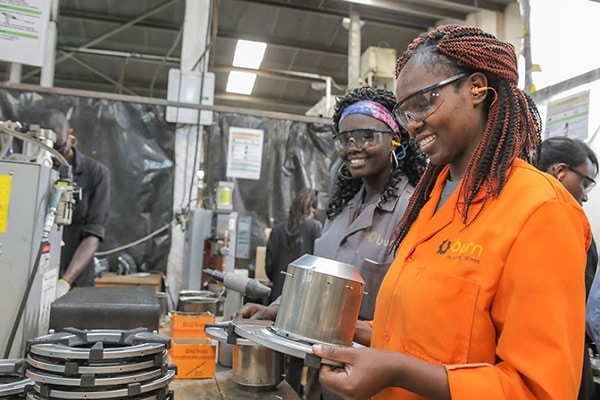- The (Women in Manufacturing (WIM) Report, Kenya, 2020) report states that success in manufacturing depends on having the necessary technical skills and expertise to carry out specific roles.
- Technical Vocational Training Authority (TVETA) industry encouraging girls to take up STEM courses at secondary and tertiary levels.
- closing the skills gap is key to closing the manufacturing sector’s gender gap that has limited businesses’ ability to evolve and expand.
By Phyllis Wakaiga
The increased participation of women in manufacturing is the inevitable change we need to achieve our industrialization goals.
With women making about half of the population, their interest in innovation and entrepreneurship is likely to lift a previously dormant half and ensure that we double productivity and economic prosperity.
The question, however, is how we effectively achieve this.
While women represent one of the significant pools of untapped talent for manufacturers, closing the skills gap is key to closing the manufacturing sector’s gender gap that has limited businesses’ ability to evolve and expand.
Over the years, the trend the world over has been more men participating in labor markets at a higher rate than women. As a result, women have remained underrepresented and under-utilized in the manufacturing workforce.
But thanks to the current fundamental transformation in modern manufacturing, as well as the rapid technological advances and convergence of physical and digital manufacturing, there are more opportunities to build the skills of women and increase their participation.
Even with this, women still remain an untapped resource. According to the 2020 National Association of Manufacturers'(America) quarterly outlook survey, for the past ten straight quarters, manufacturers’ top concern has been the inability to attract and retain a quality workforce. But while talent at all levels is becoming a critical competitive differentiator, there exists a shortfall due to a manufacturing skills gap. Unfortunately, a critical element that can aid in closing this gap is women.
In Kenya, women are not explicitly excluded from the manufacturing sector, but they remain both underrepresented and under-valued. However, there is an indication of changing trends in female workforce participation over the last five decades in the country (Women in Manufacturing (WIM) Report, Kenya, 2020).
A major reason as to why this could be happening is the clear desire of more women entrepreneurs to get into the sector. So even without conformity, society is grappling with the infinite decision to now have a focus on encouraging more women to venture into industry.
But for us to see a deliberate move in increasing women in industry, there needs to be an increased uptake of women undertaking technical skills training. With adequate technological skills, women will have a level playing ground to compete for markets and space within the sector.
The WIM report states that success in manufacturing depends on having the necessary technical skills and expertise to carry out specific roles. Adding that, as fewer young women enroll in science, technology, engineering, and mathematics (STEM) courses, the pipeline for their increased participation in the sector will remain limited.
Lack of technical skills limits the opportunities for women to participate in the manufacturing sector fully and results in most women falling within the sector’s unskilled workforce.
We must appreciate the deliberate effort by Technical Vocational Training Authority (TVETA) and industry to encourage girls to take up STEM courses at secondary and tertiary levels. This has led to an increasing number of women involved in manufacturing.
By encouraging women to train in areas that they have traditionally been exempted from, we will be inherently responding to the changing needs of society and the manufacturing sector.
In addition to this, it is also critical that we make STEM more attractive to girls and women, through improving training course relevance and linking education and skills acquisition to sector and market demands. It is also important to undertake STEM awareness campaigns in rural and urban settings aimed at girls and young women that encourage them to take STEM subjects. We also advocate for the Ministry of Education to provide affirmative action spaces to women in STEM courses.
By building the skills of women in the sector we directly influence their confidence and participation in manufacturing, to ensure that they level up and compete effectively
The Writer is the CEO of Kenya Association of Manufacturers and the UN Global Compact Kenya Chapter – Board Chair. She can be reached at ceo@kam.co.ke

